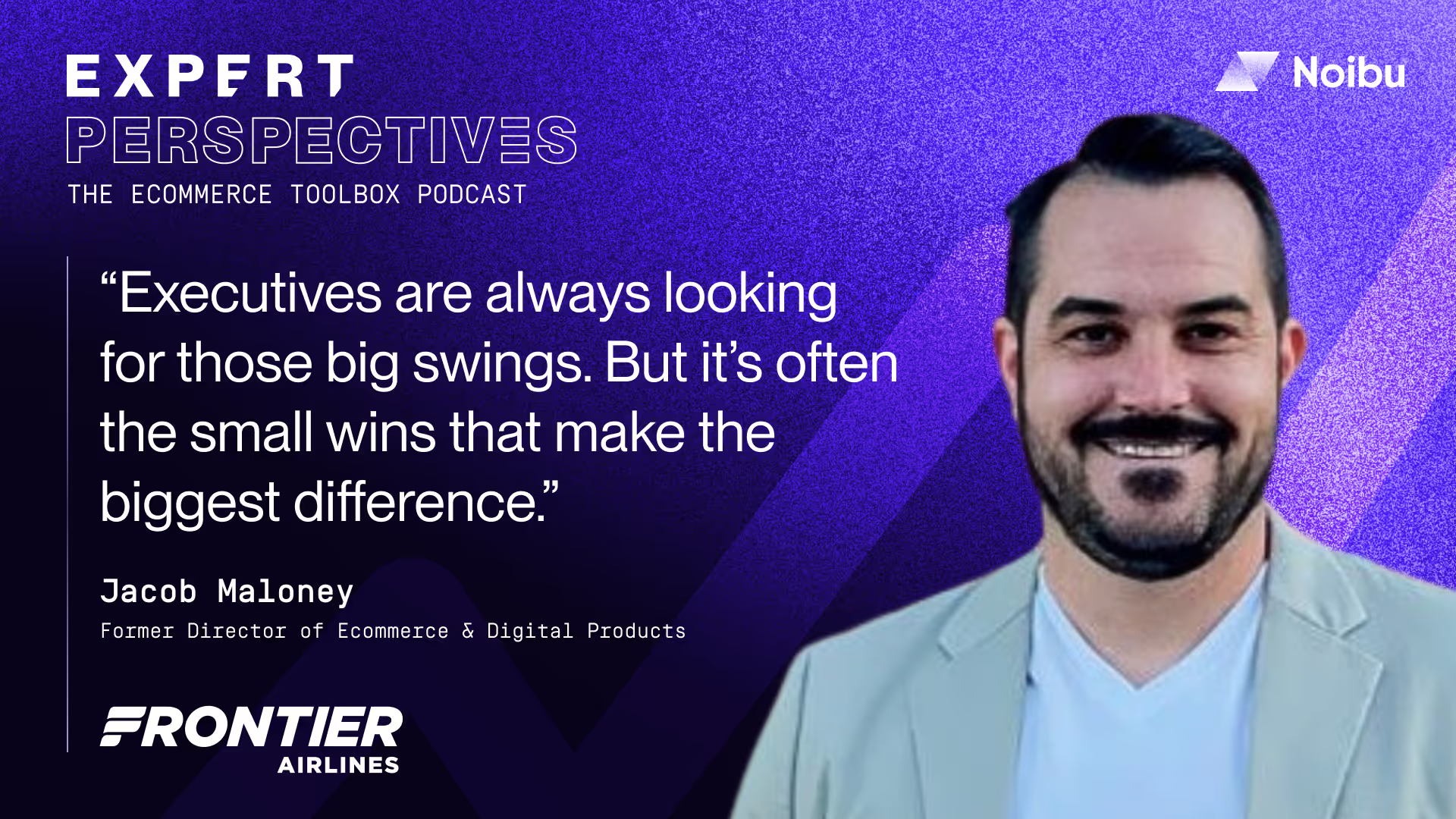When reliability is revenue: How Jacob Maloney transformed Frontier Airlines' digital commerce
.avif)
Running ecommerce for an airline isn’t just about clicks and conversions—it’s about keeping planes in the air.
Unlike most ecommerce operations, where downtime leads to lost sales or cart abandonment, an outage in airline ecommerce can halt airport operations, delay flights, and affect thousands of travelers in real-time. That’s the high-stakes environment Jacob Maloney entered when he became Director of Ecommerce & Digital Products at Frontier Airlines.
In this episode of The Ecommerce Toolbox: Expert Perspectives, Maloney shares how he built a high-performing, resilient digital ecosystem across Frontier’s web, mobile, and airport platforms—under immense operational pressure, with legacy systems, and in a highly regulated industry.
The stakes of airline ecommerce: Higher than you think
“If the website goes down, people can’t check in. They can’t board. And that doesn’t just hurt revenue—it impacts the entire operation.”
— Jacob Maloney, former Director of Ecommerce & Digital Products
At Frontier, Maloney's mission was simple: create a seamless, resilient digital experience across every customer touchpoint. That meant modernizing booking flows, optimizing mobile, reimagining airport kiosks, and ensuring that every piece of the infrastructure could withstand pressure.
From check-ins to boarding passes, even the smallest failure could create downstream operational chaos. In this world, reliability = revenue—and reputation.
Small UX changes, big revenue gains
Not every transformation required a major replatform. One of Maloney’s most impactful projects came from rethinking UX copy, layout, and calls-to-action for Frontier’s Discount Den—a membership program offering exclusive low fares.
Executives were skeptical that minor interface updates would move the needle. But after launching, the results spoke for themselves:
- +60% in new memberships
- +35% in renewals and retention
There was no redesign. No major rollout. Just incremental UI tweaks that focused on better language, placement, and clarity—proving that small changes, when targeted, can create multimillion-dollar results.

Rebuilding the digital core: From legacy to lean
When Maloney joined Frontier, the airline’s digital infrastructure was built on aging, patched-together systems that couldn’t support modern customer needs.
Rather than layering on new features over brittle tech, he led a full rebuild:
- A new greenfield website and mobile app
- A modern API and middleware layer
- A faster, decoupled enterprise CMS
- Integrated analytics and experimentation tools
This wasn’t a cosmetic change—it was an operational one. In the airline industry, a booking failure isn’t just a funnel drop. It’s a real-time disruption with financial and reputational consequences.
Innovation within constraints: Winning with legacy systems
Like banking, the airline industry is defined by legacy systems, regulatory friction, and limited flexibility. Instead of waiting for ideal conditions, Maloney’s team innovated around constraints.
Case study: Kids Fly Free
The idea: allow Discount Den members to bring their children for free on certain routes.
The challenge: federal rules prohibit advertising “free” if taxes or fees still apply—and the tech couldn’t waive those fees.
Rather than scrap the idea, Maloney created a “tech war room” with product leaders and architects. They engineered a workaround, launched the feature, and made it a staple offering—proving innovation is possible even in the most restrictive systems.
Build what you own, buy what moves you faster
Maloney used a clear framework to guide digital investments:
- Buy best-in-class tools when they accelerate time to market (e.g., A/B testing platforms, CMS, personalization engines)
- Build when you already own the data or infrastructure (e.g., fare caching, customer-specific logic)
“Why pay a vendor to resell your own data back to you?”
— Jacob Maloney, former Director of Ecommerce & Digital Products
This mindset ensured Frontier preserved strategic control over critical systems while adopting proven solutions that could scale fast.
.avif)
COVID: The industry’s inflection point
According to Maloney, the pandemic was more disruptive than 9/11. Demand vanished overnight, but when it returned, so did entirely new customer expectations:
- Not just low fares—premium experiences
- More flexibility, better service, reliable operations
At the same time, legacy carriers like United and Delta began offering low-cost pricing, erasing the cost advantage that once defined low-cost carriers.
“Now customers expect more—better seats, faster digital experiences, more premium ancillaries. That bar has moved, permanently.”
— Jacob Maloney, former Director of Ecommerce & Digital Products
Maloney recognized that airlines like Frontier needed to evolve fast, delivering value beyond price while maintaining their operational cost advantage.
Final thought: Quiet wins create loud impact
You won’t see headlines about re-architected middleware or reworked APIs. But behind the scenes, these are the quiet wins that make the difference between chaos and clarity—especially in mission-critical industries like airlines.
Jacob Maloney’s work at Frontier is a case study in digital resilience, operational empathy, and pragmatic leadership. He didn’t chase trends. He built systems that worked—consistently, at scale, under pressure.
And sometimes, that’s the most impactful ecommerce strategy of all.


.avif)

.avif)